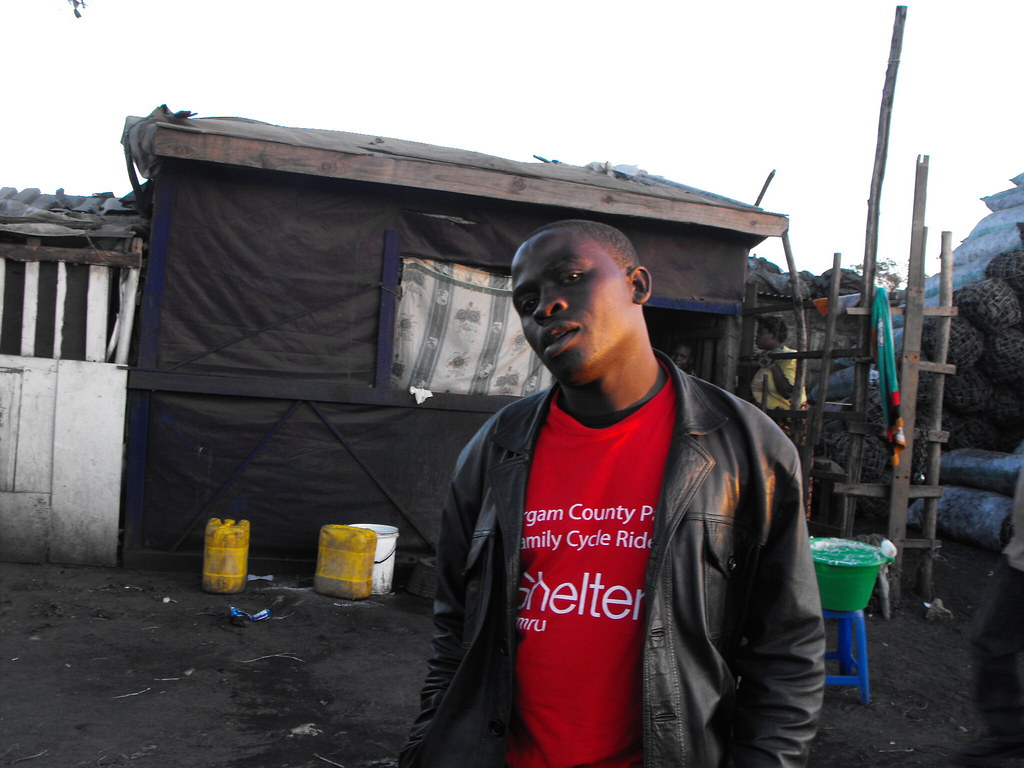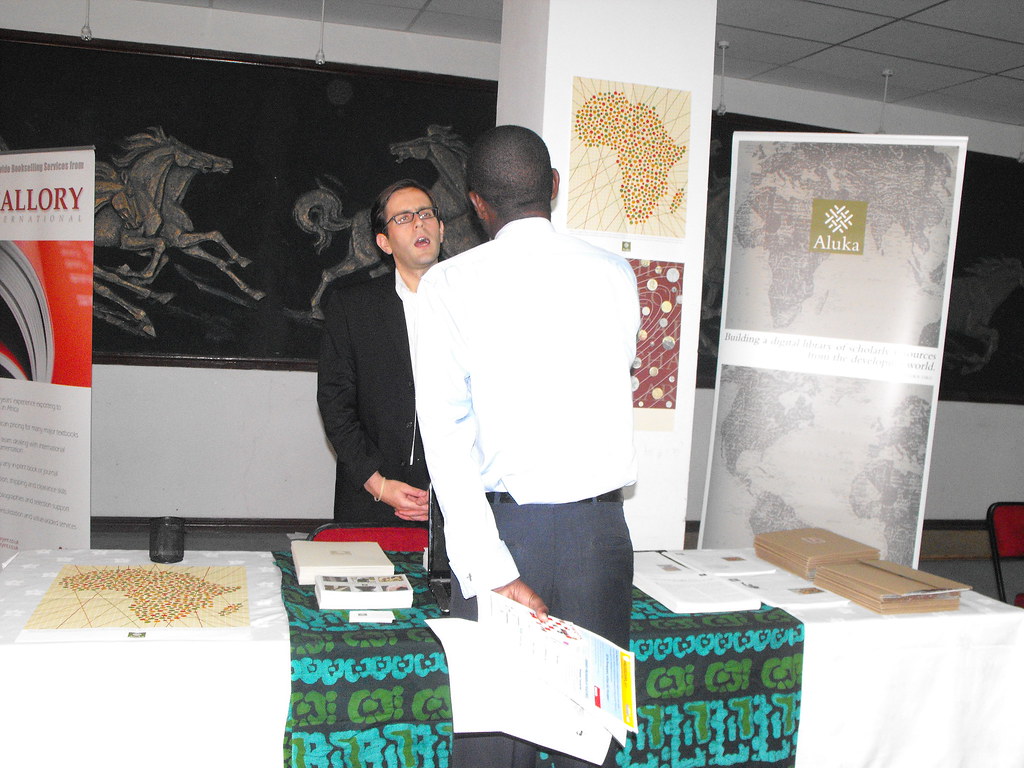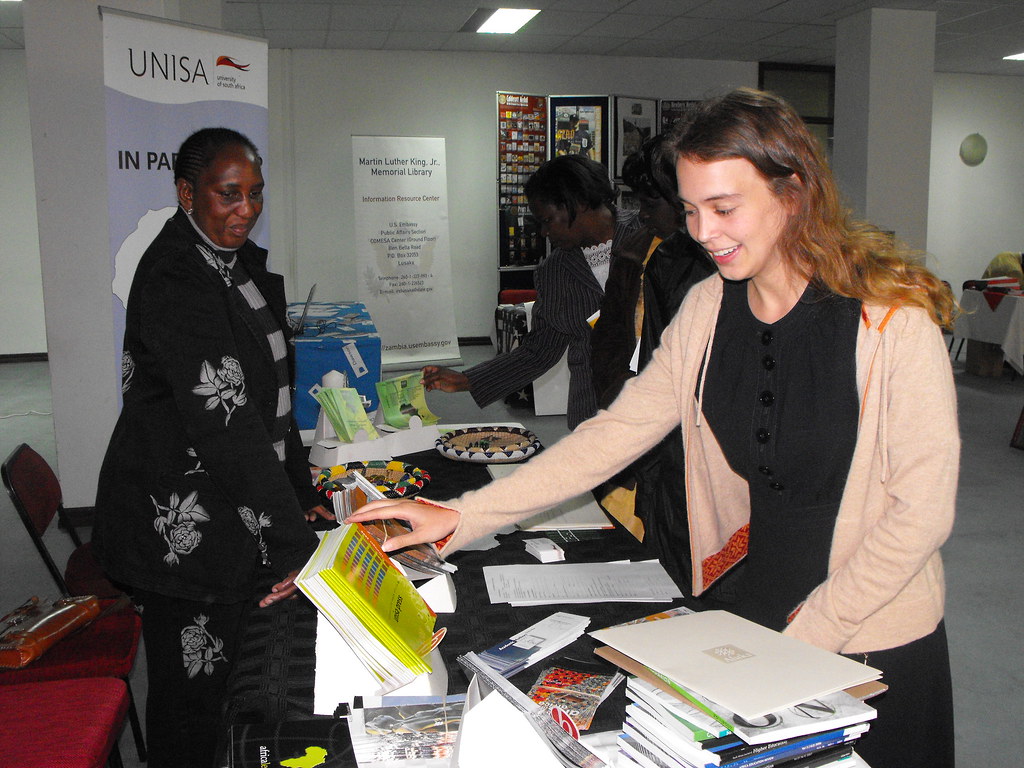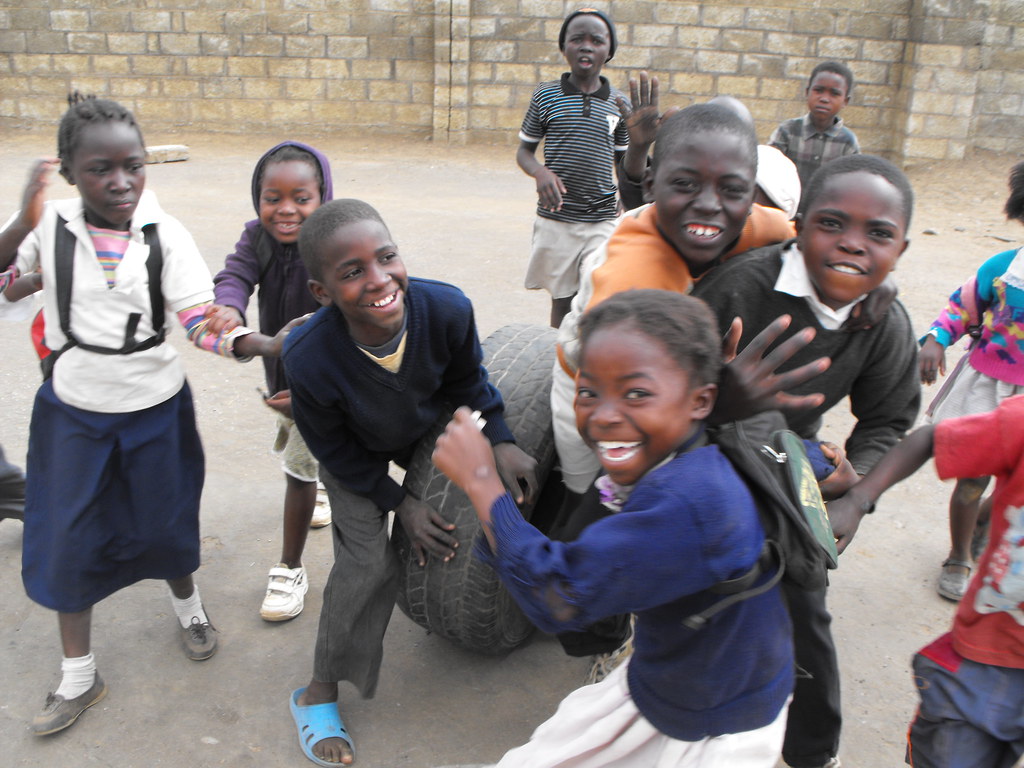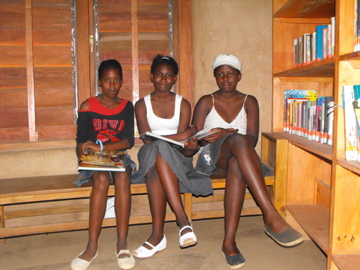
The new school session has been postponed due to the declared 21-day national mourning period for President Mwanawasa. Some kids from the shelter and the three girls pictured above who live in the surrounding neighborhood of Kamwala spent their would-be first day of school in the library. I asked the girls what they were reading which led to a discussion that was frankly shocking at first and drew a small crowd as the debate intensified.
When I lived in Harare, Zimbabwe, I spent time with girls from a nearby secondary boarding school next to my first residence. They were similar in their thirst for American pop culture, but I never heard any non-traditional statements about gender from them. I get the idea that things are beginning to change.
I recorded as much as I could, but unfortunately I can't transcribe much of it. Here's what I was able to get down.
The girls (from left): Ruth, 12, Mulala, 13 and Annie, 14
Books: Stanley and Livingstone: Expeditions Throughout Africa
Classic Fairy Tales
me: What are you reading?
Annie: I'm reading about African expeditions. This is the book our group worked with on Saturday.
(note: She's referring to a Saturday program offered at the library in which groups of four select books and present them to the class, usually as a skit.)
me: David Livingstone is a huge name in Zambia, of course. What do you think of him?
Annie: I like him because he was the first white man to reach Africa. I think he helped people to learn a lot. He helped the system of slavery. Some people hate him, but for those who understand what he did, they would not hate him...Here's a map of the ways he moved through Africa. He died in Africa but went back to Europe to be buried. He named the falls after Victoria, the Queen of England because she was in charge so it was out of respect.
me: How do you think Africa was different before he arrived?
Annie: They had their own system but they didn't have knowledge like in Europe. They were ignorant. Whites came to get slaves and often died because black people are stronger, so they survived. As for the white people, they knew slavery was bad. Black people thought trading people for goods was okay because they were ignorant.
People like from the United States, they didn't classify us as human beings. They thought only monkeys lived in Africa. It was sad.
me: So you're saying that white people were ignorant when it came to Africa, right?
Annie: Yes.
me: None of this makes you angry ?
Annie: No, because white people introduced technology and what was right and wrong.
(At this point, a few people came to listen and appeared upset by Annie's opinions.)
Mulala: You don't understand what you're saying, Annie. Zambians knew right from wrong. White people did some bad things to Africans. I don't know why you are saying this!
me: What do you mean by "what was right and wrong"?
Annie: Some came to explore rivers, mountains, deserts, the land. Morton, Speke, Park, men like this. Others came for missionary work. Let me explain them: they came to spread the word of God. They knew right from wrong. Africans did not know. Some Africans did not know slavery was wrong. In America, they opened plantations, that's where they took the slaves.
me: How do you think missionaries helped?
Annie: Because Africans put people in a big room if they did something wrong and exchanged them for things and gave them to whites as slaves. They didn't know right from wrong, you see.
me: So who taught you this?
Annie: My teacher at school.
me: This sounds like your teacher's opinion, doesn't it?
Annie: Yes, it's an opinion. Some agree, others think it's bad. Witchcraft was the culture before missionaries, and some people still practice it. It's used for selfish reasons sometimes.
me: So if you practice witchcraft, you don't know right from wrong?
Annie: No, it's just an opinion. It's doesn't mean they don't know right from wrong.
me: And it was around before missionaries, so maybe the missionaries didn't teach Africans right from wrong. Maybe Africans were not ignorant. Maybe Europeans, even missionaries, were ignorant themselves.
Annie: It was just a way of life. Maybe they were not ignorant.
(Now there was a small crowd of boys from the center listening to Annie.)
me: What about Colonial times? Sometimes Africans weren't treated fairly.
Annie: Yes, but if Africans weren't treated the way they were treated by Europeans, we wouldn't have education and other things.
Mulala: No, Annie! They took our minerals for themselves! They did not help us!
Annie: We benefited from it. We wouldn't have used those minerals, anyway.
Mulala: We did not benefit, Annie! Not until independence! Someone was faking you. We could have gotten something from it. Look at South Africa, which is a more developed country than Zambia. They were kept down by Apartheid and now they are free to develop their land. Slaves do not benefit from their owners!
(The crowd supported this statement with a few outbursts. I just slid into a corner with my pen and notebook.)
Annie: Slavery had advantages. One: slaves learned something. Slaves went to school.
Mulala: Annie! Slaves were NOT taken to school! They were sent to work for nothing. And for instance, say a slave went to United States and learned something maybe. Do you think they can come back to Zambia? They cannot!
Annie: Let's say Fountain of Hope is Africa and Kamwala High [School] is Europe. If they don't come to us, we learn nothing! Fountain of Hope needs Kamwala High School.
Mulala: The way it is now, many Europeans left Zambia and went back to Europe. Are you saying we are not learning now, without them? We are ignorant again in Zambia, Annie?
Annie: If Africa were left alone, we would be ignorant! We would not know God.
[from the crowd]: White people are not God!
The missionaries came with a bible and a gun, as they say. [laughs]
[The debate continued for some time, but Annie persisted with her ideas and it ended with "agree to disagree."]
Mulala: The white men, they have babies with Zambian women, but they never marry them! There was an Egyptian man who impregnated my cousin, but he didn't marry her. He went back to Egypt. Then she died, so we called him and he came to get his son who was five. He no longer calls us. According to me, it's wrong.
Annie: But they were lovers! It's okay because it's not allowed in Egypt.
Mulala: Maybe if she had gone to Egypt they would have killed her. She had another child, a daughter, who was half-Lebanese. They don't know who the father is, they just keep her here. My cousin was bad news! Okay, the Egyptian man thinks the girl is his child. She told us before she died. She needed him to send money for both children, so that is what she told him.
Annie: She had to lie to secure a future for her daughter.
me: How did she die?
Mulala: She was very sick. She was in her late twenties. Maybe malaria?
Mulala: I don't know if I would get involved with a white man now. It depends. The cultures are different, but some men are just good and some are not. Some would lie and tell me they would marry me but would not. Some men might accept the difference, some not. I would ask him first.
Annie: If a guy really likes a girl, he could lie and say it's okay but later say "no."
Ruth: Some people think that to keep a relationship, you have to follow what the guy wants. It's very bad, guys can be dangerous. They can try to control you. I'm very scared to love someone, get into a sexual relationship and find out he's [HIV] positive.
Mulala: Also, you could get pregnant. And then the guys can finish school, but you cannot.
me: Well, you can use...
Mulala: Condoms are not 100 percent.
Ruth: If someone is a prostitute, let's say, who's fault is it: the guy or the girl? Mualala says the girl.
Mulala: I did NOT say that, I said that the girl decides to do it.
Ruth: If no one went to prostitutes, no girls would become prostitutes.
me: Good point.
Mulala: We are called prostitutes if we do not follow the rules of dress here.
me: I know, I've experienced it. I didn't know dresses had to be below the knee, and I brought my summer dresses and some of them are above the knee. I don't know what to do! I wear this dress all the time.
Mulala: We can take you to the shops in Kamwala and help you find something. But it's not fair. If you buy a skirt, you must wear leggings under it. Then it's okay.
me: I bought a black skirt to my ankles that I feel kind of ridiculous in.
Mulala: I'm tired of these rules.
Mulala: Are these fairy tales true? Something in it?
me: You mean, are they based on true stories? Not exactly, no.
Mulala: Cinderella. It happens, so it's very interesting. The stepmother can treat you badly.
Annie: I've never come across any fairy godmothers. It's all lies.
Ruth: No, but the stepmother paying more attention to her daughters and not the stepdaughter can be true.
me: What do you think about Cinderella being saved by a rich man?
Mulala: That is not something good. In Zambia, many people think that will happen.
me: In America, many people think that will happen, too. I don't like the Cinderella story. I'll be honest.
Annie: As for me, I don't either. I think most rich people are mean, and they should marry rich people. A rich person and a poor person, that is not a good situation. It can bring bad things.
Mualala: We have a rich friend. She had a birthday party at a hotel, and her parents gave her a car and money. But her father is never around. He is in Tanzania or here or there. She has a driver because she's 13.
Ruth: She says, "I'm too hot to handle, too rich for any man to buy."
[Repeated by everyone a few times. I imagine this line refers to the dowry that remains as a standard procedure for marriage in Zambia.]
Ruth: Tell us: does true love exist?
me: Um...yes, of course it does.
all: No.
Mulala: In the movies it does, but it does not exist in life.
boy listening in: Yes, it does. You just do not know who is good and who is bad.
me: Do you guys want to take a walk?
Mulala: Yes, let's go.
I'm meeting these girls at the library again tomorrow. Mulala has texted me a few times to confirm. Excited to finally have some female friends at Lubuto!
































